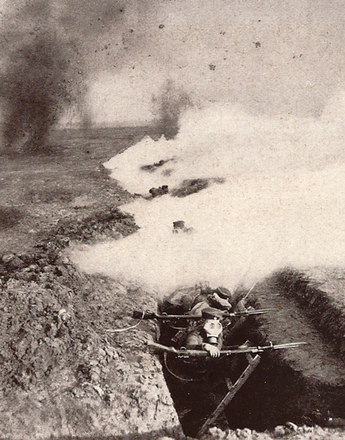Belgium’s neutrality was disregarded by Germany for operational reasons. In contrast, less attention was paid to Greece’s neutrality. Although Prime Minister Elftherios Venizelos tended towards the Western Powers, the ‘Germanophile Camp’ around King Constantine had considerable scope of action. However, Constantine’s followers were confronted by the presence of Entente troops, who were not be used against Bulgaria and its allies alone, and in Serbia’s interest, but also exercised a significant influence on the internal development of Greece.
The opponents of the Central Powers occupied highly sensitive strategic positions and humiliated the Athens government with ultimatums and demonstrations of power, while conversely King Constantine laid the ground for the Hohenzollern Empire and thus really turned Venizelos’ followers against him. Venizelos eventually formed an opposing government supported by France, whereupon the country suffered a division with civil war-like riots.
Similarly, the conviction now held sway that energetic measures would have to be taken against those forces amongst the anti-German allies that hitherto had sought solutions based on compromise. The Western Powers thus occupied Thessaly, the Isthmus of Corinth, Piraeus and Athens, and so ultimately forced Constantine to abdicate in favour of his son, Alexander. Under these conditions, Venizelos returned to the capital and with the support of a parliamentary majority declared war on the Central Powers on June 29, 1917.
Neither for the first nor for the last time, grave internal discord shaped the young state of modern Greece. However, the ‘Period of National Schism’ from 1915 to 1917 also resulted in a decision in favour of the concept of a ‘further liberation policy’, in favour of ‘Venizelos’ Greece of two continents and five seas’, of the ‘new countries and the irredentists’. An essential basis for this course of continued expansion was laid by the military operations of the Greek troops, who took part in the fighting on the Balkans in 1917/18, contributing significantly to the turning point of the war in the South Eastern battlefields.
In this context, the territorial gains in Thrace and Asia Minor were especially important for the Athenian Government, while the Entente’s military forces at the ‘Salonica Frontline’ had little influence on the situation and were mostly decimated by disease. The morale of the armed forces on the ground was not lifted until the end of 1917, and only then could the connection between the allied contingents be restored. Nevertheless, the Bulgarian offensive conducted from the ‘Salonica Frontline’ in September of 1918 contributed decisively to the collapse of the Central Powers.
Evans, Martin Marix: Forgotten battlefronts at the First World War, Stroud 2009
Leontaritis, G.B.: Greece and the First World War. From Neutrality to Intervention 1917–1918, New York 1990
-
Chapters
- The Fading-Out of the Balkan Front
- The War before the War
- Sarajevo and the July Crisis
- Ethnic Conflicts and the Brutalisation of the Battles
- Disillusionment for the Army – The Failed ‘Punitive Expedition’
- ‘The Allies’ Successes’
- The Occupying Regime in Different Regions
- Romania's Entry into the War and Defeat by the Central Powers
- Greece on the Side of the Entente
- 1918 – Peace between Romania and the Central Powers
- Consequences of the War on the Balkans





